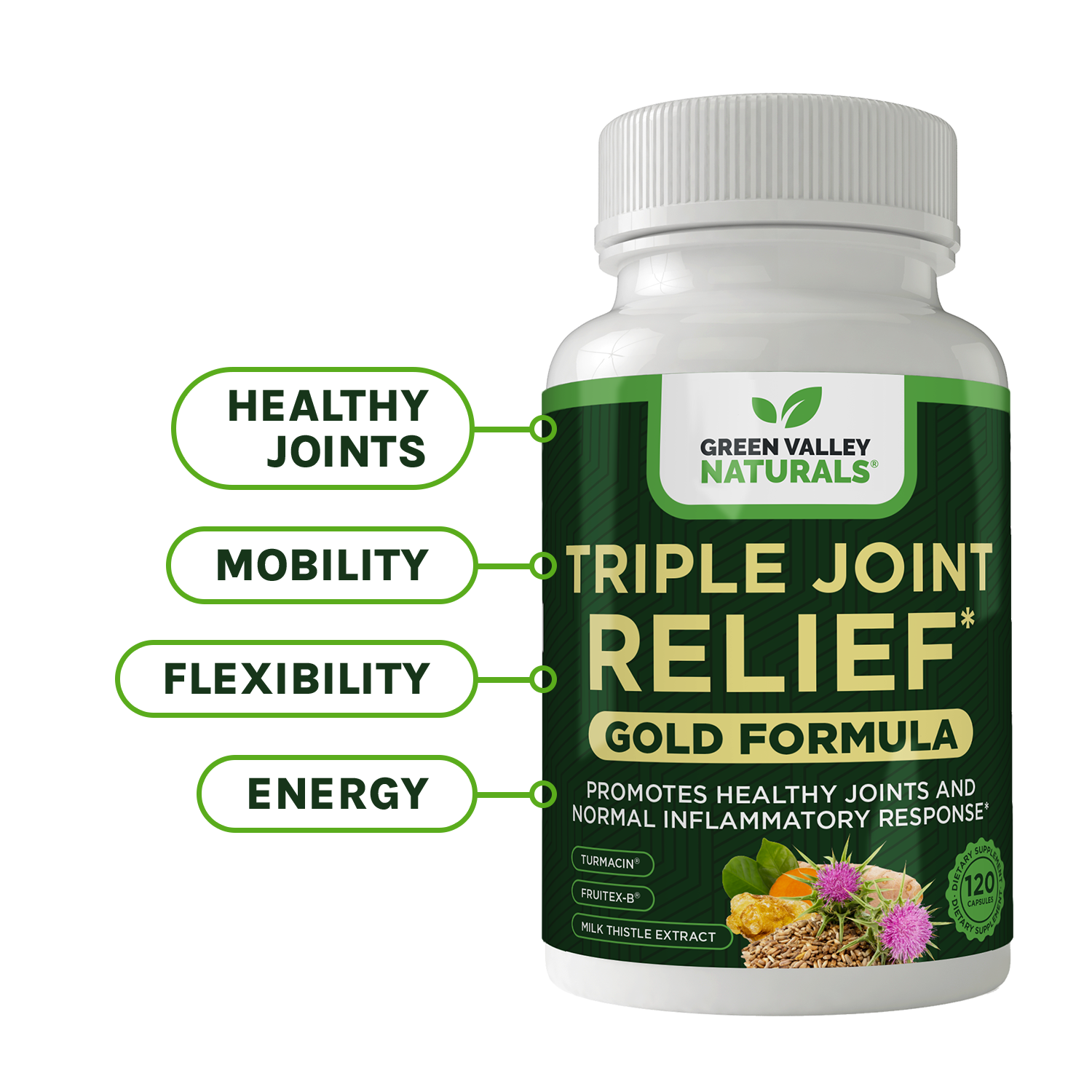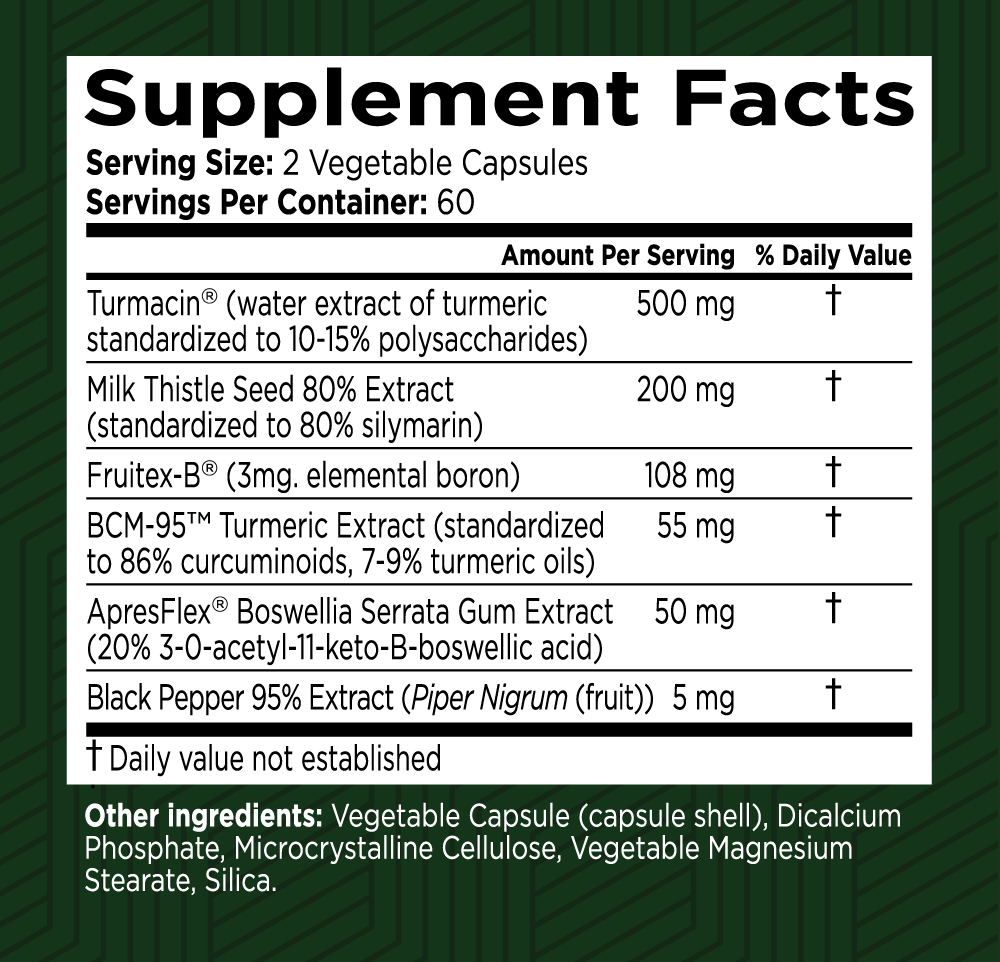Triple Joint Relief Gold
Promotes healthy joints and normal inflammatory response...
Key Ingredients

Fruitex-B® (3mg. elemental boron)
This ingredient is included for its anti-inflammatory properties. Boron is a natural trace mineral known for its healing powers. FXB-Boron specifically targets TNF-Alpha, one of the three inflammatory molecules, and has been shown to significantly reduce joint pain within a short period.

Black Pepper 95% Extract (Piper Nigrum (fruit))
A special blend of Turmeric, Turmacin is designed for fast action and high absorption. Unlike regular Turmeric, which contains only curcumin, Turmacin includes additional compounds that enhance its effectiveness. BCM-95 is added to increase the absorption of curcumin by 900%, ensuring that the body utilizes it more efficiently for joint pain relief.

Apresflex® Boswellia Serrata Gum Extract (20% 3-0-acetyl-11-keto-B-boswellic acid)
A powerful extract from the Boswellia tree, known for its anti-inflammatory properties. This particular form of Boswellia is touted to be ten times more powerful than the original. It is shown to provide significant relief from joint pain, starting as early as 5 days after beginning use. Boswellia ApresFlex® is effective in reducing joint swelling and improving overall joint function.

Turmacin® (water extract of turmeric standardized to 10-15% polysaccharides)
A special blend of Turmeric, Turmacin is designed for fast action and high absorption. Unlike regular Turmeric, which contains only curcumin, Turmacin includes additional compounds that enhance its effectiveness. BCM-95 is added to increase the absorption of curcumin by 900%, ensuring that the body utilizes it more efficiently for joint pain relief.

BCM-95™ Turmeric Extract (standardized to 86% curcuminoids, 7-9% turmeric oils)
A special blend of Turmeric, Turmacin is designed for fast action and high absorption. Unlike regular Turmeric, which contains only curcumin, Turmacin includes additional compounds that enhance its effectiveness. BCM-95 is added to increase the absorption of curcumin by 900%, ensuring that the body utilizes it more efficiently for joint pain relief.

Milk Thistle Seed 80% Extract (standardized to 80% silymarin)
Milk Thistle Seed 80% Extract (Standardized to 80% Silymarin) is a potent natural extract offering comprehensive health benefits. Its primary component, silymarin, not only supports liver health but also reduces inflammation, making it a crucial ingredient for promoting overall wellness and joint health.
Frequently Asked Questions
Your health is our top priority
Here at Green Valley, we only work with US-based manufacturing facilities that are cGMP (Good Manufacturing Practices) compliant and FDA inspected.
Our products are triple tested by our manufacturers to ensure potency and purity and are stored in our temperature and humidity-controlled warehouse right here in the Shenandoah Valley, Virginia. And we ship directly to your doorstep – we don’t share warehouse space and we don’t hand off your business to a third party to fulfill your order.
Best of all, all Green Valley products come with our 90-day Satisfaction Guarantee. If you are unhappy with the product for any reason, simply call or email our customer support team and return the unused portion of the product within 90 days of your order. We’ll refund every penny of your purchase (less shipping), no questions asked!

Triple Joint Relief Gold Customer Reviews
Green Valley Naturals is one of the places I can trust
Green Valley Naturals is one of the places I can trust.. to provide me with nutritional supplements that really help me with all my health problems without the side effects that drugs have with them.
Hip pain is gone and no longer using a cane
Hip pain is gone and no longer using a cane. Have put off hip replacement surgery for now. Triple Joint Relief Gold Formula has done what no other - of many others - has ever done: Total hip joint pain relief. After about two to three weeks I started noticing positive changes.
I think they might be helping some it is hard to tell
I think they might be helping some it is hard to tell.







